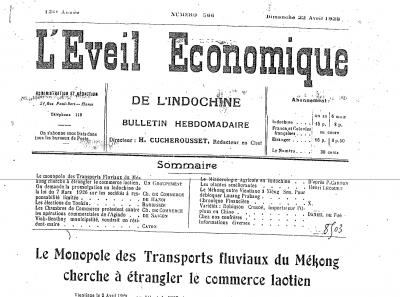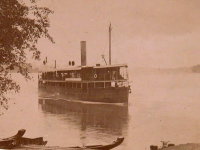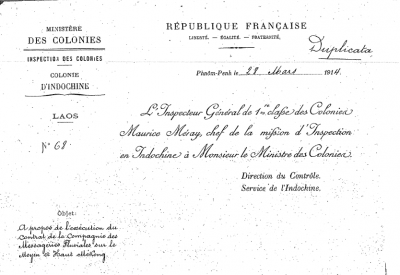
the River Shipping Company of Cochinchina, story of a monopoly - 3/3
Power and neglect
The adventure and passion for the river must have dwindled with the advent of the later contracts: in 1914, no question of a 20-years monopoly anymore, and the terms were tightened so much as to turn the Messageries essentially into an administration.1) Between the ebb and flow of the Mekong, the lack of diligence of the officers in charge and insufficient infrastructures, The Messageries, went on neglecting their duties until the outrage flared in the late 20s.
Power and neglect
About a paved road along Khôn island, built less than 10 years before: “M. le Résident Supérieur p.i. en marge du rapport sur la province de Bassac: Il est certain que c'est l'esprit de suite qui a le plus manqué au Laos. Il semble que les routes faites aient cessé d'intéresser M. Mahé -et c'est ici le cas- dès l'instant où elles étaient terminées. Aujourd'hui la chaussée est envahie par l'herbe, les ponts sont effondrés et la machine complètement rouillée sera très difficile à remettre en état.”
Mr. the interim Superior Resident in the margin of the report on the province of Bassac: Surely the spirit of continuity is what lacked most in Laos. It seems that roads, once built, ceased being of interest to Mr. Mahé -and this is the case here- as soon as they were complete. Today the pavement is overgrown with weeds, the bridges have collapsed and the rusted out engine is going to be very hard to put back in order.“
Then the Compagnie Saïgonnaise de Navigation et de Transport (C.S.N.T.)2) and based in Saigon, the Messageries steeply increased the river transportation fares in 1926, once the contracts had been secured for a new period, thus opening wide the way for Siamese (Thai) competition, anchoring their bad name with the residents of Laos, and firing outrage in the metropole.

The business became essentially a conglomerate: the capital of the Messageries was invested into as diverse sectors as plantation and transformation of rubber, the Comptoirs Généraux de l'Indochine (general commercial venture, state-sponsored), public works and electricity, sawmills and the Crédit Foncier de l'Indochine, a bank.3)
The C.N.S.T. was eventually sold in 1938 to the Société de Chalandage et Remorquage de l’Indochine (River shipping and Tugging company of Indochina).
THE END
But… still to be continued with: A Steamer Named Bassac!




